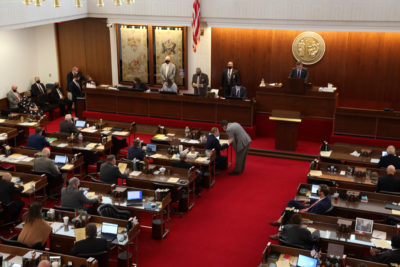

|
|
A pair of General Assembly education committees pushed ahead with a number of education-related bills this week, and a few other pieces of legislation made their way through their respective chambers.
Let’s take the headlined bills first: A House education committee Tuesday gave a favorable vote to a bill that would require criminal background checks for teachers, among others. More specifically, an applicant for licensure would have to submit to a background check.
That same committee also voted in support of a bill that would let teachers take personal leave without having to pay the cost of their substitute teacher.
Currently, if a teacher takes personal leave on a day when they have to be in the classroom, they are responsible for covering the cost of the substitute teacher who will take their place. Under this legislation, however, if the teacher provides a reason for taking personal leave, they won’t be responsible for covering the cost of a substitute.
The committee also included a bill that would mandate the creation of threat assessment teams at schools in the state.
All three of those bills are still in the House, but two other bills made it through that committee and all the way through the House by the end of the week.
One of those bills would replace the annual end-of-course tests in grades 9-12 with a “nationally recognized assessment of high school achievement and college readiness.” Ultimately, it would mean students could go from taking four tests during high school to just one. The bill would also eliminate the requirement that career and technical education students take the ACT WorkKeys assessment. That would be replaced with a new career readiness indicator.
The other bill would make it easier to fast-track the formation of certain charter schools.
Those both are now in the Senate, though as The News & Observer’s Keung Hui notes in the tweet below, the Senate has previously refused to act on a bill that would get rid of end-of-course tests.
The House also passed a host of local calendar flexibility bills. You may remember these from last week’s legislative roundup.
- COVID Impact on Craven County School Calendar.
- Address Pandemic Learning Loss/Select Systems.
- School Calendar Flexibility/WSFCS.
- School Calendar Flex./Certain School Systems.
- Graduations/School Calendar/Certain Counties.
- School Calendar Flexibility/Moore County.
- School Calendar Flexibility/Certain LEAs.
- Address Pandemic Learning Loss/Counties.
You may also remember this from last week’s roundup: “The House has traditionally been more amenable to giving school districts calendar flexibility than the Senate, and it seems the same will be true this time. Senate President Pro Tem Phil Berger, R-Rockingham, told The News & Observer such bills won’t gain traction this long session.”
Since that writing, nothing has changed to make the bills’ passage any more likely.
Meanwhile, something unique happened in a House state government committee this week: A bill that would prevent school boards from suing their county commissioners over school construction funding disputes was rejected. According to the NC Insider, the bill failed in a 5-4 vote but could come up in the committee again later. It’s uncommon for a bill that comes up in a committee to be voted down in that committee.
The Senate education committee met Wednesday and considered a number of bills discussed in this article. One would increase the amount of money opportunity scholarship recipients get and expand income-level eligibility for those scholarships.
Since that article, the opportunity scholarship bill passed another Senate committee and has been put on the calendar to be voted on by the full Senate on May 4. The same is also true of another bill, which takes up a number of waivers the State Board of Education is seeking from lawmakers to relax accountability requirements around standardized testing. The federal government has already offered waivers in these areas, but the State Board needed state lawmakers to sign off as well. Read more about that here.
Also, a bill that makes it easier for child care facilities to keep their star ratings passed the Senate this week. Senate Bill 570 delays state assessments and loosens requirements on teacher education levels until 2023, aiming to help providers with teacher vacancies.
In other news, Gov. Roy Cooper gave his State of the State address this week. Find out everything he had to say about education here.
EducationNC reporter Liz Bell contributed to this article.





